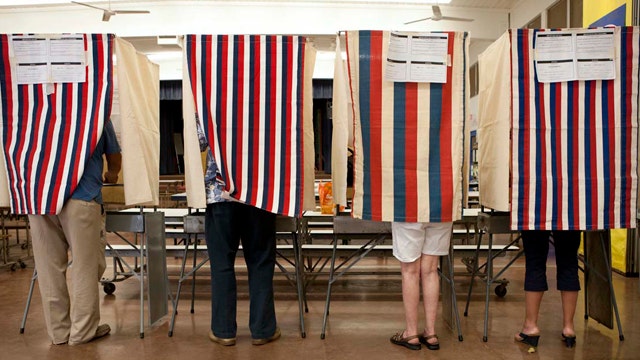Will Democrats show up to the polls?
Joe Lestingi and former Senator George LeMieux on whether this trend will hold come Election Day
A trend-line is emerging in the polls that is buoying Republicans’ spirits for the Nov. 4 midterms – beyond President Obama’s unpopularity and a few key races turning in their favor, the numbers show GOP voters simply care about this election more than Democrats.
And that could translate to a sizable advantage in turnout next month.
A Fox News poll released last week showed 45 percent of Republicans described themselves as “extremely” interested in the election, compared with 30 percent of Democrats.
The results aligned with a recent Gallup poll also showing Republican and Republican-leaning voters far more interested in the midterms. Forty-four percent of Republicans described themselves as “extremely” motivated to vote, compared with just 25 percent of Democrats.
Surveys also indicate that, compared with past elections, interest among voters of both parties is low this year, making for an unpredictable election night. But GOP strategists say dissatisfaction among Americans with the direction of the country ultimately will boost their candidates.
“That’s why you see Republican candidates having real momentum right now,” said Andrea Bozek, the National Republican Congressional Committee’s communications director.
That Democrats are less enthused or motivated is expected, considering they typically turn out in low numbers in election years without a White House race.
But this year could be particularly unnerving for Democrats, considering the poll numbers raise doubts about their success in slowing the historical trend with get-out-the-vote efforts for such loyalists as young people, unmarried women and minorities. For instance, their participation dropped 21 percent from 2008, a presidential election year, to 2010, a midterm year, according to the nonpartisan Voter Participation Center.
Campaigns to keep Hispanic voters excited about going to the polls this year for Democratic candidates suffered a setback in September when President Obama decided to delay executive action on immigration, resulting in some of the country’s most influential Latino groups accusing him of caving to election-year politics.
“We are bitterly disappointed in the president,” said Frank Sharry, executive director of the group America’s Voice. “The president and Senate Democrats have chosen politics over people.”
Pollsters almost unanimously now say that Republicans will add to their House majority. But whether they can win a net total of six Senate seats to take control of the upper chamber remains the biggest question of the 2014 cycle. A recent Wall Street Journal/NBC News poll shows that likely voters prefer a Republican-controlled Congress over a Democrat-controlled one, 46-44 percent. The Fox News poll released last week also showed, in a generic ballot test, likely voters prefer the Republican candidate over the Democrat in their House district by 45-42 percent. Likely voters also want to see Republicans win control of the Senate, 47-43 percent.
The GOP has tried to capitalize on Obama’s low second-term approval ratings. But the recent polls show voters from both parties appear more likely to stay home in frustration, instead of rallying to elect better lawmakers.
When voters were asked in the Gallup poll whether they were more enthusiastic than usual about voting, an average of 37 percent answered yes this year -- the lowest since 2002 -- amid Obama’s approval rating of 42 percent.
Though the Gallup poll showed voter interest and enthusiasm lower than in the 2010 and 2006 midterms, and voter turnout projected to be at 2002 and 1998 levels, Democrats argue the enthusiasm exists where it’s most needed.
“In states with 11 key Senate races, voters prefer a Democratic controlled Senate by a 5 point margin, 47-42,” Democratic Senatorial Campaign Committee spokesman Justin Barasky said after the release of the Wall Street Journal/NBC poll.
He also argued the poll shows the unlikeliness of a “wave election” like the one in 2010 that gave Republicans control of the House and prompted Obama to declare the results a "shellacking."
The Wall Street/NBC poll that showed voters this year prefer a Republican-controlled Congress over a Democrat-controlled one 46-44 percent had the margin at 50-43 percent in 2010.
If there’s one aspect of the races on which most everybody agrees, it’s that money spent in the final weeks will play a major role.
Caleb P. Burns, a Republican adviser and attorney with the Washington, D.C., law firm Wiley Rein LLP, thinks the tepid enthusiasm, at least on the GOP side, is the result of fundraising challenges resulting in little spending so far on ads and other voter-outreach efforts.
“Money hadn’t been coming in, he said. “But it’s coming off the sidelines now, which might spike voter engagement in the last few weeks.”
The other factor, he says, is that 2014 doesn’t have any marquee Tea Party candidates like those in the 2010 midterms who attracted the attention of voters of practically every political stripe. “It shows how the Republican Party is developing,” Burns told FoxNews.com.
Last week, Washington Democrats appeared ready to pull much of their money out of the Kentucky Senate race – where Alisan Lundergan Grimes is running against Senate GOP Leader Mitch McConnell -- to perhaps spend in closer contests. The committee responded by saying it continues to “invest every day in Kentucky” with millions of dollars for airing ads and the largest voter-outreach effort in state history.
Bozek argues that her group is spending money on TV ads against 16 House Democratic incumbents while the Democratic Congressional Campaign Committee is spending money to defend 18 of its incumbents.
“We’re playing in Democratic districts from New York to Maine to Illinois to California,” she said.













































